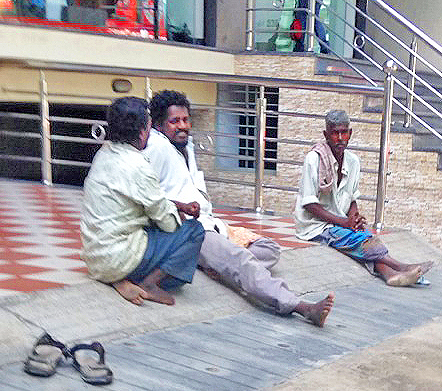![Scattering of light from particulate matter and pollution in Bangalore, India.By mproopesh (Own work) [CC BY-SA 3.0], via Wikimedia Commons](https://earthdesk.blogs.pace.edu/files/2015/06/Bangalore_sky_at_Sunset.jpg)
Scattering of light from particulate matter and pollution in Bangalore, India.By mproopesh (Own work) [CC BY-SA 3.0], via Wikimedia Commons
«« »»
COMING FROM THE U.S., one must see India through a certain lens. But it takes time. India is a far more complex, nuanced, and enigmatic nation than most of us understand. It can be a culture shock.
I am living in Bangalore, more properly Bengaluru, capital of the State of Karnataka. It is one of India’s more modern and economically ascending cities. Still, the nation’s culture, from its deep flaws to its splndiferous diversity, is in abundant evidence here.

Laborers taking a rest in front of a store in Bangalore. Photo Kiefer Kofman.
India is composed of twenty-nine states, each with a vastly different culture, landscape, government and demography. Most have their own regional language. People tend to identify themselves by their region and religion underlies much of the culture. 82% identify themselves as Hindus, while most of the rest of the population are Muslim, Sikh, Jainist, Christian or Buddhist.
To put this in perspective, India’s Islamic population numbers only 15% of the national population of approximately 1.25 billion, yet it is the second largest Islamic population in the world. Further crystalizing the potential for divisions in India, is the caste system, which was a human rights issue even before 19th century British rule, though it is often played down in the 21st century. Given its size and diversity, India more closely resembles a continent of twenty-nine different nations.
India’s economic, political and social issues and disparities are mostly hidden to the outsider.
To understand India, and the experience an American takes from it, these are the nuts and bolts. India presents a fusion of challenges, experiences, and moral tests. The Indian experience becomes that much more illuminating when one can understand this background, and the foundational reasons why complex issues of inequity persist.
For a political science major and public policy wonk like myself, India presents the ideal challenge: a political and judicial system mired in deep corruption, immense economic inequality, religious tension and subjugation. Though it has the seventh largest GDP, it is one of the lowest ranking nations on the Human Development Index — 135th out of 187 .
Bangalore is an excellent hub for a recipient of a Gilman Scholarship to study and conduct political research. It represents the inequality of the nation and its clash between rising globalization and those who have been left behind, economically and culturally. Studying here at Christ University and taking courses on human rights, the issues and challenges facing India begin to organize themselves in much clearer fashion.
India’s economic, political and social issues and disparities are mostly hidden to the outsider. Yet, an acceptance of the status quo seems a natural aspect of Indian society. One of my goals in traveling here is to identify the root factors contributing to these problems that seem uniquely immutable. I believe I am nearing my answer, as I will attempt to outline in more descriptive, on-the-ground blog posts to follow.









